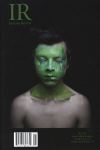Indiana Review – Summer 2013
Indiana Review is not a nicey-nicey publication. A fair amount of the content, while high quality, exhibits an “edgy” quality, as in it won’t-put-one-to-sleep, or make one sigh. It won’t give warm-fuzzies, or make one feel like cuddling up in a big chair with hot chocolate. What it will do is remind one of the hazards of existence and the unsettling realities of life in a vivid and entertaining manner.
Indiana Review is not a nicey-nicey publication. A fair amount of the content, while high quality, exhibits an “edgy” quality, as in it won’t-put-one-to-sleep, or make one sigh. It won’t give warm-fuzzies, or make one feel like cuddling up in a big chair with hot chocolate. What it will do is remind one of the hazards of existence and the unsettling realities of life in a vivid and entertaining manner.
It contains nonfiction such as D. Gilson’s “On Faggot: An Etymology,” in which the author tries to squarely look that uncomfortable word “faggot” in the face, find some peace of mind, and make some sense with it—and it isn’t easy. And Eric Tran’s nonfiction work “Release the Panda Bear” discusses the author’s strange and complicated venture (“What do you wear to an orgy?” he begins), and it is revealing but not comfortable.
In another work of nonfiction, “An Open Letter to World War I Soldier Alexander Bradley Burns of Downer Grove, Illinois on the Occasion of My Father’s Retirement After Six Years in the United States Air Force Reserves, Plus Twenty More in the U.S. Army Reserves” by Kathleen Rooney, the author is caught up with the mystery and romance of a young life she never knew, cut short, juxtaposed against the record of her father, who survived conflict. This piece, while sentimental, indulgent, and getting a bit lost in detail, still held my attention quite well. The author makes both lives seem relevant—the young soldier who sacrificed his life and the old soldier who sacrificed his family life. She points out the heroism in both their manners of service. The author compares the ironies in their lives and pays homage to both soldiers.
The fiction also has teeth. “Housewives, Mothers” by Misha Rai is a tale of young girls just as determined to conquer the world as young men are, but they can only succeed when they learn the cruelest lesson of all: they must defer to the awful young men they feel superior to. Only when they “lose” to the young boys do they pass the test—a tortured lesson of sexism, perhaps, or cruel reality, or is it simply life? I could not work out the lesson posed in the story because the ending was ambiguous. It might be a good trick women learn, or it might be the cruel fate of women—one should read it and think on it.
“The Bird Catcher” by Phedra Deonarine notes the pitfalls in trying to help an illiterate homeless man find gainful employment when he runs into problems he can’t solve by himself. Laura Ender’s “Repossession” takes one on a bumpy ride with a bumpy ending. The poetry is varied, and somewhat prickly in the sense in will stimulate rather than soothe. Stevie Edwards’s – interesting poem “Nobody Is Lost” begins, “Nobody is alone. Nobody is stalking / the playground like it will disappear again // into the dust of teenagers and flame.” The journey is perhaps existential, perhaps more real to some, and I felt as though it meandered down some pleasant paths. I didn’t push to figure out what it meant; I just let it run over me.
Don’t read this literary magazine as a cure for insomnia. Read this to cure brain fog, or boredom, or for not feeling alive. It will prick one into a sense of awareness that there is a world out there that does not conform to our ideals, and does not live by the rules, and will not go away.
[indianareview.org]





